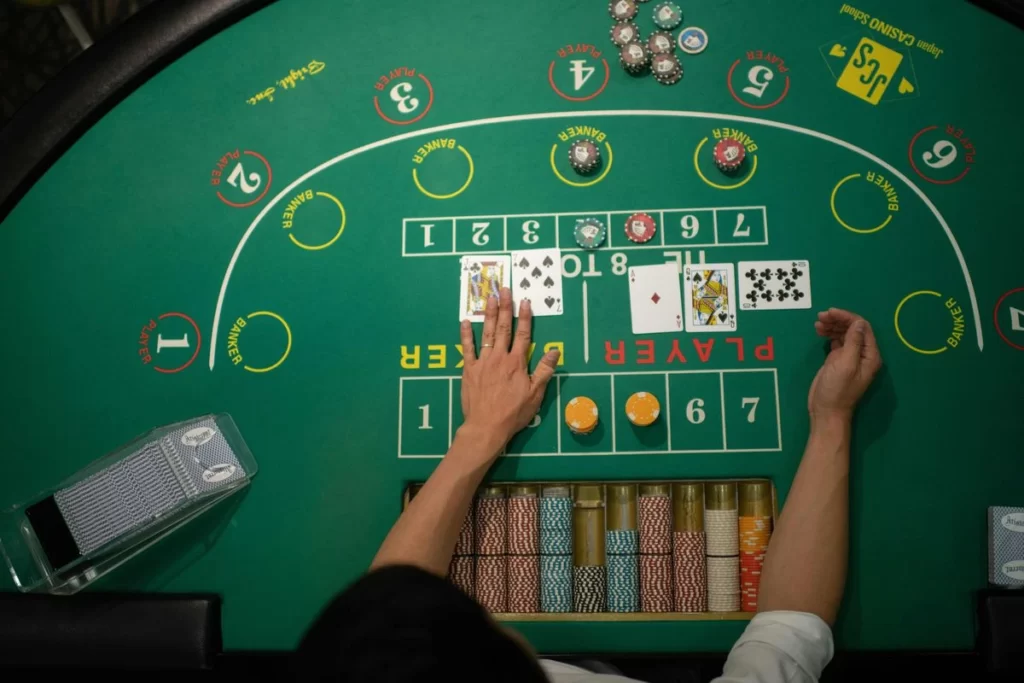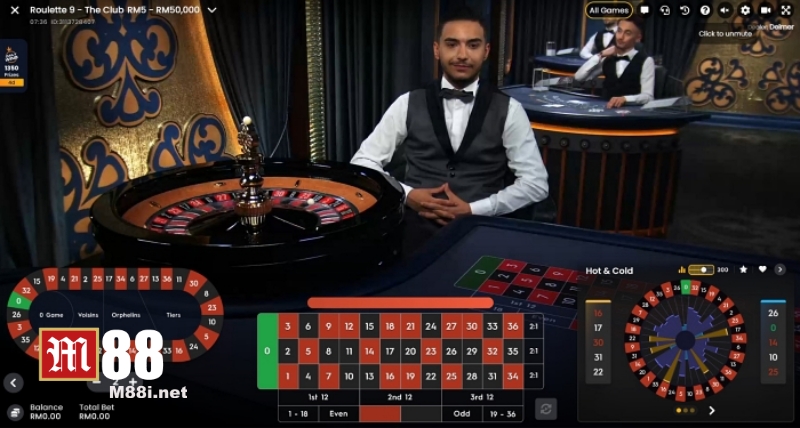Baccarat’s appeal lies in its simplicity and the relatively small advantage the house holds over players. Here’s a closer look at the house edge and payout structure in baccarat, which are critical factors that influence the game’s dynamics M88.
House Edge in Baccarat

- Banker Bet: With a house edge of roughly 1.06%, this bet is the most advantageous for the player, despite the standard 5% commission on winnings. This is due to the rules governing the Banker’s play, which slightly favor the Banker’s hand over the course of many hands.
- Player Bet: Slightly less favorable than the Banker bet, the Player bet carries a house edge of about 1.24%. No commission is taken on winnings from the Player bet.
- Tie Bet: The Tie bet is an outlier with a significantly higher house edge, usually around 14.36%. This makes it an unattractive option in terms of statistical probability, as it is less likely to occur than either the Banker or Player bets.
Understanding these percentages helps players comprehend why seasoned baccarat enthusiasts often recommend betting on the Banker despite the commission.
Baccarat Payouts
Here’s what players can expect when they win with different bets:
- Player Bet: Pays 1:1. If you bet $100 and win, you get $100 in winnings plus your original bet, totaling $200.
- Banker Bet: Also pays 1:1, but after the 5% commission, the net payout is 0.95:1. For a $100 bet, you’d receive $95 in winnings plus your original bet, totaling $195.
- Tie Bet: Typically pays 8:1 or 9:1, but this can vary by casino. For an $100 bet at 8:1, you’d win $800 plus your original bet, totaling $900.
Why Banker Is the Go-To Bet
Despite the commission, the Banker bet remains the most popular due to its lower house edge. The casino’s commission is a way to ensure their advantage even when the odds are slightly in favor of the Banker’s hand winning.
The Risk of the Tie Bet
The Tie bet’s attractive payout reflects its rarity and the high house edge, indicating that it is not expected to win often. Consequently, while the potential payout is high, the expected value of making this bet is typically lower than that of making Banker or Player bets. This is why it is generally advised to avoid the Tie bet if you’re playing with an eye on optimal strategy.
Strategy Implications
In baccarat, the optimal betting strategy is to consistently bet on the Banker. While the outcome of each hand is independent and there are no patterns or guarantees, the probabilities slightly favor the Banker’s hand over time. By understanding and accepting the house edge and payout structure, players can manage their bankroll effectively and enjoy the game M88 while minimizing potential losses over the long run.
Odds of Banker vs. Player Win
In baccarat, the odds of the outcome on the Banker or Player bets are:

- Banker Win: With a probability of around 45.84% and a house edge of 1.06%, the Banker bet is slightly more likely to win than the Player bet. Despite the 5% commission on winnings, the Banker offers the best betting odds in baccarat.
- Player Win: The Player has a win probability of about 44.62% and a house edge of 1.24%. The Player bet pays even money and does not incur a commission, making the calculation of winnings straightforward.
The difference between the Banker’s and the Player’s winning probabilities is the possibility of a tie, which occurs less frequently and has a much higher house edge, making it a less desirable bet in terms of odds.
Choosing Banker or Player
While the odds suggest the Banker bet is the best play, betting on the Player is also a viable option with a relatively low house edge. Players who do not want to deal with the commission calculation might prefer betting on the Player for its simplicity.
Strategy Takeaways
- Baccarat players looking for the most statistically favorable bet should opt for the Banker despite the commission due to its lower house edge.
- Players who enjoy strategic decision-making might prefer blackjack, as they can influence the game’s outcome with their choices.
- Craps enthusiasts have the opportunity to place bets with very low house edges, especially when backing their Pass or Don’t Pass bets with odds bets.
- Roulette players seeking better odds should look for European roulette tables to avoid the higher house edge associated with the American version’s double zero.
- Slot machine players should pay attention to the specific game’s paytable and house edge, as these can vary widely.
Ultimately, understanding these odds and how they compare across different games can help you make more informed decisions in the casino, thus potentially improving your overall gaming experience.


